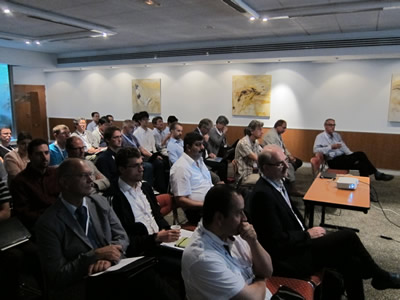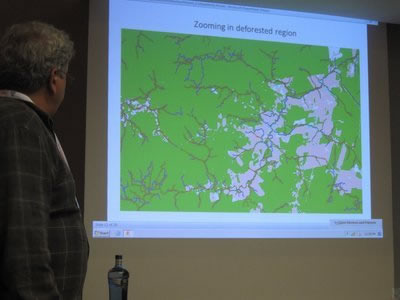PANDEMICS ANALYTICS 2025 - International Conference on Pandemics Analytics
October 26, 2025 - October 30, 2025
PANDEMICS ANALYTICS 2025
Onsite and Online Options: In order to accommodate various situations, we are offering the option for either physical presence or virtual participation (pdf slides or pre-recorded videos).
ISSN:
ISBN: 978-1-68558-313-2
PANDEMICS ANALYTICS 2025 is colocated with the following events as part of SocSys 2025 Congress:
- PANDEMICS ANALYTICS 2025, International Conference on Pandemics Analytics
- PREDICTION SOLUTIONS 2025, International Conference on Prediction Solutions for Technical and Societal Systems
- SOCIETY TRENDS 2025, International Conference on Technical Advances and Human Consequences
- MODERN SYSTEMS 2025, International Conference of Modern Systems Engineering Solutions
- AIVTS 2025, The First International Conference on AI-enabled Unmanned Autonomous Vehicles and Internet of Things for Critical Services
PANDEMICS ANALYTICS 2025 Steering Committee
|
 |
Les Sztandera
Thomas Jefferson University
USA
|
|
 |
Shada Alsalamah
King Saud University
Saudi Arabia
|
|
 |
Les Sztandera
Thomas Jefferson University
USA
|
|
 |
Shada Alsalamah
King Saud University
Saudi Arabia
|
PANDEMICS ANALYTICS 2025 conference themes:
Fundamentals models
From epidemic to pandemic situation theory; Empirical metrics on pandemic disruptions (social, medical, economic, educational); Models for ongoing pandemics (real-time); Predicting pandemic models; Models for pre-pandemic, early pandemic, and late pandemic; Tentative early estimation of causality; Prediction vs preparedness models; Explainability of pandemic models
Models and tools requirements
SIR (S- susceptible, I - infected and R - recovered); Susceptible–Infected–Recovered–Susceptible, Susceptible–Infected; Using Digital Twins approach for simulation; Meta heuristics-based propagation models; Percolation model (state of disorder to another more ordered state); Pandemic branching process with latency model [newly registered and latent cases]; Interactive interface/maps; Big data, Datasets, Artificial Intelligence, Machine learning, and Deep learning; Real-time data visualization; Cross-country visualization data; Cartography software and platforms; Interactive pandemic dashboards; AI-based tools for vaccine distribution and vaccination.
Solutions via coordinated pandemic Data/Datasets
Big Data-based technologies for prevention and control; Evaluation of data reliability and accuracy cross-countries; Obsolete models based on historical data (needs: reinforcement learning and distributed learning); Public and non-public federal spending data sets; Correlation of independent territories worldwide; Identify local and global data inconsistency; Access to consistent real-time health data infrastructure; Models with inconsistent, incomplete, and lagging data; Improvements on real data updates (collection, circulation, and security)
Solutions considering pandemic dynamics
Propagation pandemic models; Propagation forecast and analysis; Contamination frequency; Plateau patterns; Shape pandemic; Pandemic waves; Asymmetrical dynamics of epidemic propagation; Pandemic as chaos models; Individual contact graph
Selection of adequate pandemic metrics
Epidemic transmission parameters; Uncertainty and accuracy in prediction models; Outbreak data and reproduction; Motion, rate, disorder, speed… of particles; Range of reproduction numbers; Geolocation location and mobility data; Proximity tracing for pandemic control; AI-based real-time contact tracking
Models for pandemic severity estimation
Pandemic intensity; Herd immunity and effective reproduction (1--> N); Estimation of basic reproduction; Awareness diffusion in multiplex networks; Susceptibility and infectivity between aware and unaware individuals; Relax the degree of immunization
Preparedness models and required actions
Traveling and pandemic; Highway pandemic-oriented planning; Optimizing locations of medical institutions; Preparing logistics models; Urban models (local) and global preparedness; Types of generation mechanisms of individual awareness
Models for panic model propagation
Pandemic panic propagation model; Models of social response to pandemic; Urban models (local) and global models; Real-time optimization of panic prediction models; Conflicting governmental and agencies analytics
Sustainable IT environments for COVID-19 pandemic
Infrastructure for scalable gathering&processing data (Grid, Cloud, and Virtualized Computing); Scalable and interacting communication infrastructure; AI-driven pandemic preparedness logistics and explainability; Interactive tools for pandemic dynamics; Powerful visualization and online analytics tools; Personalized data interactive interfaces; Real-time data stream classes for virtual collaborations; Personal data protection
Lessons learned from COVID (+) (and counting)
Growth in research collaborations: boom and bust; Experience in short lifecycle vaccine production; Cross-nations logistics (knowhow, supplies, personnel, etc.); Experience online/physical presence classes (intensive use of Digital Connections); Universal observed pattern: re-balance the cooperation team with research teams; Needs for unified data collection standards; Acceleration of global logistics for drug discovery; Alerting: flexibility vs time; Real data-driven decisions; Roles of social network and social media
Lessons learned from COVID (-) (and counting)
Impact on geopolitical tensions; Red-flagged countries and their jurisdictions; Combating propaganda damaging the reliable information; Damage of scientific direct relations due to travel bans and infection/quarantine risks; Anxiety for socializing; aloofness; changes of humankind relationships; Damage the social-cognitive knowledge of the young students; Creation and increase of digital addiction; Roles of social network and social media; Need for digital detoxification; Issues with real-time data (Low efficiency of data collection, Difficulty in guaranteeing data quality, Low efficiency of data use, Lack of timely data sharing, Data privacy protection)
Deadlines:
Submission | Jul 25, 2025 |
Notification | Aug 27, 2025 |
Registration | Sep 09, 2025 |
Camera ready | Sep 21, 2025 |
Deadlines differ for special tracks. Please consult the conference home page for special tracks Call for Papers (if any).











































